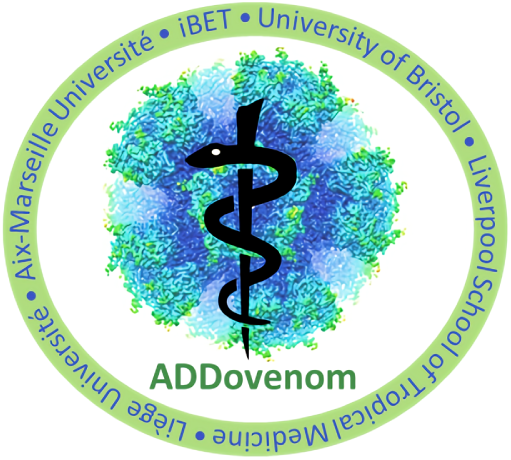ADDovenom researchers publish preprint on echis venoms
A preprint paper providing a preclinical evaluation of the paraspecific efficacy of three Echis monospecific antivenoms has been published by ‘Preprints with The Lancet’. Co-authored by LSTM’s ADDovenom researchers Rebecca Edge, Nicholas Casewell, and Stef Menzies, plus others, ‘Preclinical evaluation of the neutralising efficacy of three monospecific antivenoms against the venoms of five African Echis […]
ADDovenom features in Horizon magazine
Horizon, the EU Research and Innovation Magazine, has published an article about the ADDovenom project, and the search for more effective treatments for snakebites. It includes contributions from ADDovenom Project Coordinator Prof Christiane Berger-Schaffitzel (University of Bristol), and Prof Nick Casewell (PI at LSTM). Author Michael Allen writes: “The researchers have turned to a new synthetic […]
ADDovenom researcher awarded Marie Skłodowska Curie Fellowship
Dr Konrad Hus, a Research Associate at the University of Bristol, has been awarded a Marie Skłodowska Curie Fellowship for a project aimed at finding effective solutions for neutralizing the neurotoxic effects induced by African mamba venoms. Leveraging the ADDovenom platform, the project will identify binders with broad cross-reactivity against the neurotoxins commonly found in […]
ADDovenom researchers lead Engineering Biology Mission Award project
ADDovenom researchers will lead a new project on snakebite treatments, one of twenty-two UKRI Engineering Biology Mission Awards announced by the UK government in February 2024. Prof Christiane Schaffitzel (University of Bristol) is Principal Investigator, with Prof Nick Casewell (LSTM) as Co-Investigator, on the project: Haemotoxic and cytotoxic snake venom metalloproteinases – production, enzymatic specificity, […]
ADDovenom researchers co-author new paper on ADDobodies and ADDomers
Four current and former researchers from the ADDovenom team at the University of Bristol are among the authors of a paper about ADDobodies and ADDomers, published in the journal Structure in January 2024. ADDomers (adenovirus-derived nanoparticles) comprise 60 copies of adenovirus penton base protein (PBP). They are thermostable, which means ADDomer-based therapeutics can be stored, […]
Thomas Crasset awarded FRIA doctoral scholarship
Congratulations to Thomas Crasset, who has been awarded a four-year FRIA (Fund for Research Training in Industry and Agriculture) doctoral scholarship by Le Fonds de la Recherche Scientifique (FNRS). In his project, based at the Mass Spectrometry Laboratory (MSLab) at University of Liège, Thomas will develop analytical methodologies and data processing to better describe how […]
ADDovenom project explained in new paper
ADDovenom: Thermostable Protein-Based ADDomer Nanoparticles as New Therapeutics for Snakebite Envenoming, a paper describing the aims of the ADDovenom project and the methodologies being used, has been published by Toxins (28 November 2023). AbstractSnakebite envenoming can be a life-threatening medical emergency that requires prompt medical intervention to neutralise the effects of venom toxins. Each year up […]
Researcher Spotlight: Konrad Hus
For our Researcher Spotlight features, we interview members of the ADDovenom research team, to find out about their interests, their contributions to the project, and their hopes for the future of venom research. Here, we speak with Konrad Hus, a Postdoctoral Research Associate at the University of Bristol. Can you tell us briefly about your […]
ADDovenom poster displayed at Venoms & Toxins 2023
Iara Aimê Cardoso, a Research Assistant at Liverpool School of Tropical Medicine, presented a poster at the 10th International Toxinology Meeting – Venoms & Toxins 2023 (Oxford, 22-24 August 2023) about some of the ADDovenom team’s research. Iara’s poster, Mapping the post-synaptic neurotoxic profile of mamba venoms by functional and ligand binding assays, was based […]
ADDovenom annual meeting takes place in Liverpool
The ADDovenom team gathered at the Liverpool School of Tropical Medicine for this year’s annual meeting (12-13 September), discussing progress towards the production of the next-generation of snakebite treatments. Researchers from University of Bristol, LSTM, iBET, University of Liège, and Aix-Marseille University were joined by Scientific Advisory Board members Gerard Lambeau and Stefanos Grammatikos for […]

